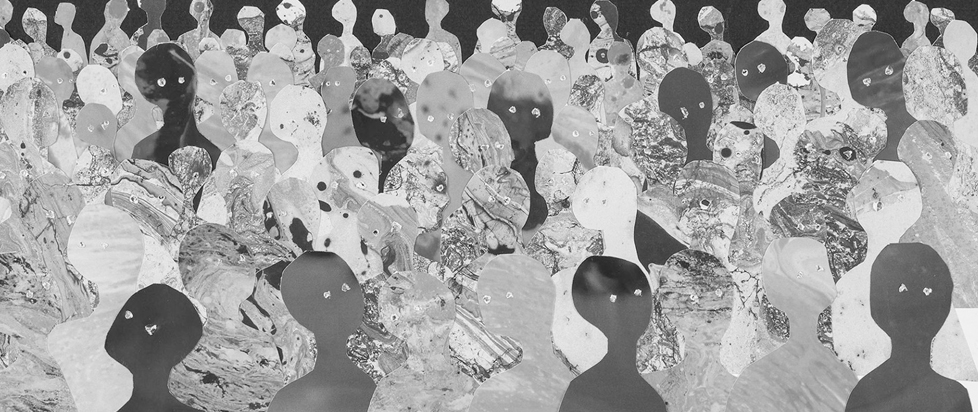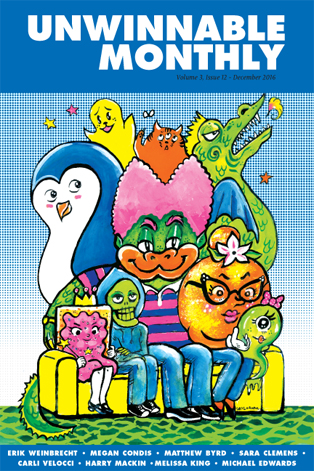
The Song Doesn’t Remain the Same
 Rookie of the Year is a monthly column in which Matt Marrone grapples with music, games and family life. This column is a reprint from Unwinnable Monthly #86, the Family issue. If you like what you see, grab the magazine for less than ten dollars, or subscribe and get all future magazines for half price.
Rookie of the Year is a monthly column in which Matt Marrone grapples with music, games and family life. This column is a reprint from Unwinnable Monthly #86, the Family issue. If you like what you see, grab the magazine for less than ten dollars, or subscribe and get all future magazines for half price.
———
I don’t know the first person who tweeted it, but I’ve seen this sentiment all over Twitter since Election Day:
There’s going to be a lot of great art.
I’ve seen arguments written for and against this idea. One side says great art comes from dark times; the other says dark times don’t guarantee a thing. So we’ll have to wait and see. But that long November 8 night has already had a notable aesthetic effect: the way we hear the music of 2016 has changed, perhaps forever.
It’s December now, the month when, as part of a tradition dating back to 1993, I’ve selected my Album of the Year. My nominees were posted on my now comically outdated music blog on Thanksgiving, as usual, but knowing I’d be away this year, I wrote the blurbs ahead of time, on a sleepless night in October.
Now, as I listen to the records – with an ear on which ones rise above the rest for me – their meanings have become nearly unrecognizable. If I were writing those blog blurbs now, I might have a few different things to say; in other words, there’s been a lot of great art this year – but the dark times have cast much of it in an entirely new light.
A record’s timelessness is hard to gauge, but to me it’s essential. That test is happening now, in light speed. Some records that touched me two months ago, still do now, but for different reasons. The greatest works keep evolving over time; when Kate McKinnon, dressed as Hillary Clinton, played “Hallelujah” on Saturday Night Live, it didn’t sound like a 31-year-old song. At breakfast the next day, when the story was recounted to a table of weekend travelers, we were told they had changed the words to fit the election result. I almost spoke up right then to say they hadn’t, but I held my tongue in a moment of hesitation. Later, we drove down a country road and listened; though we hardly did a line-by-line comparison, we knew the words were the same.
Leonard Cohen died the same week America lost an election and his new record seems full of the same foreboding and mourning – but for now, at least, I can’t hear it being about L. Cohen’s relationship with God and him facing his mortality; it feels more about what we’re facing as a nation – not just a President-Elect who seems to fit the title of the record – You Want It Darker – but about something more than liberal sore losing.
It’s about us coming together and figuring out what the hell is going on here.
Of course it’s hard not to draw parallels to the man in the golden tower in the title track. This is about God, right, not about He Who Should Not Be Named?
If you are the dealer, I’m out of the game
If you are the healer, it means I’m broken and lame
If thine is the glory then mine must be the shame
You want it darker
We kill the flame
But on the second track, “Treaty,” another no-doubt Cohen classic, he sings this, and it could have been said around any Thanksgiving table, or Christmas dinner, if less poetically:
I’ve seen you change the water into wine
I’ve seen you change it back to water, too
I sit at your table every night
I try but I just don’t get high with you
I wish there was a treaty we could sign
I do not care who takes this bloody hill
I’m angry and I’m tired all the time
I wish there was a treaty, I wish there was a treaty
Between your love and mine
We don’t want to kill each other, do we? Not families who voted for a different candidate, at least, right? I feel like we’re all searching for that treaty, but can only wish for it, not write it.
There’s more on Cohen’s record, but he’s not the only nominee. Radiohead’s A Moon Shaped Pool is almost too frightening to even turn on. “Burn the Witch” morphed from a thrilling, disconcerting opener, to a far more chilling, uncomfortable one. And then the rest of the record – the resignation that a relationship is over, that there’s no fight left to fight, that the war has been lost, that the only thing to do is the dance of distance for self-defense, and to step off the train and disappear into the woods.
There’s always been a certain level of resignation to Radiohead’s music. The dystopian future is here, the first cloned baby has been born, the dinosaurs roam the earth and perhaps the best we can do is find ways to dull the pain.
This message suited the end of Thom Yorke’s relationship with the mother of his children, but it seems out of sync with a battle we’re not about to face. A war that must be won.
And yet. He sings:
Dreamers
They never learn
They never learn
Beyond the point
Of no return
Of no return
Then it’s too late
The damage is done
The damage is done
As if to say, yes, we lost. Yes, the innocents are being burned as the stakes, but learn from these mistakes. Stop the bleeding, if there’s any blood left to bleed.
Bon Iver’s 22, A Million, has a similar concept of romantic loss, but Justin Vernon is definitely still fighting. The first track has a synthetically altered voice intoning, “It might be over soon.” What will be over? Before it seemed like a love affair, or fame, or maybe life itself.
I know it sounds melodramatic, and I hope one day I can read this and laugh at myself, but now it feels like it’s about our democracy. Or at least civility in public discourse. And treating each other with respect and empathy. Or perhaps that’s already over. Not soon, but too soon.
There’s resignation on the record. The final line of the final song says so much: “Well it harms it harms me it harms, I’ll let it in.”
But that’s a song of hope. A sample, used in the refrain, asserts “the days have no numbers” – on a record obsessed with math – and leaves room for a brighter future:
I worried bout rain and I worried bout lightning
But I watched them off, to the light of the morning
And there’s less passive struggle, too, as Vernon implores a lover, perhaps in vain, on the third track:
Turn around, you’re my A-team
Turn around, now, you’re my A-team
God damn, turn around now
You’re my A-team
This morning, I put on Gillian Welch’s Boots No. 1 – an honorable mention this year that collects outtakes and demos from her 1996 record, Revival. On “Annabelle” – in which Welch tells the story of a mother who, among other naive hopes, never wants to see her baby daughter cry – is this refrain, which we later learn is carved into the gravestone of the woman’s grandmother:
And we can not have all things to please us
No matter how we try
Until we’ve all gone to Jesus
We can only wonder why
Part folk, part gospel, it’s the reason Welch is a timeless writer, why her songs read like standards. They stand the test of time.
As I listen to this year’s Album of the Year nominees, timelessness is on my mind more than anything. Not the sounds – whether they be rock chords or hip-hop beats or pop jangle or electronic bleeps and bloops. It’s not the day’s headlines, but the heart that makes the difference.
Which is why I keep coming back to Cohen. And to Vernon. And to Radiohead. It’s why I know one of them is going to win. When I make my final call in a couple weeks, I have to let the songs tell me where to go.




